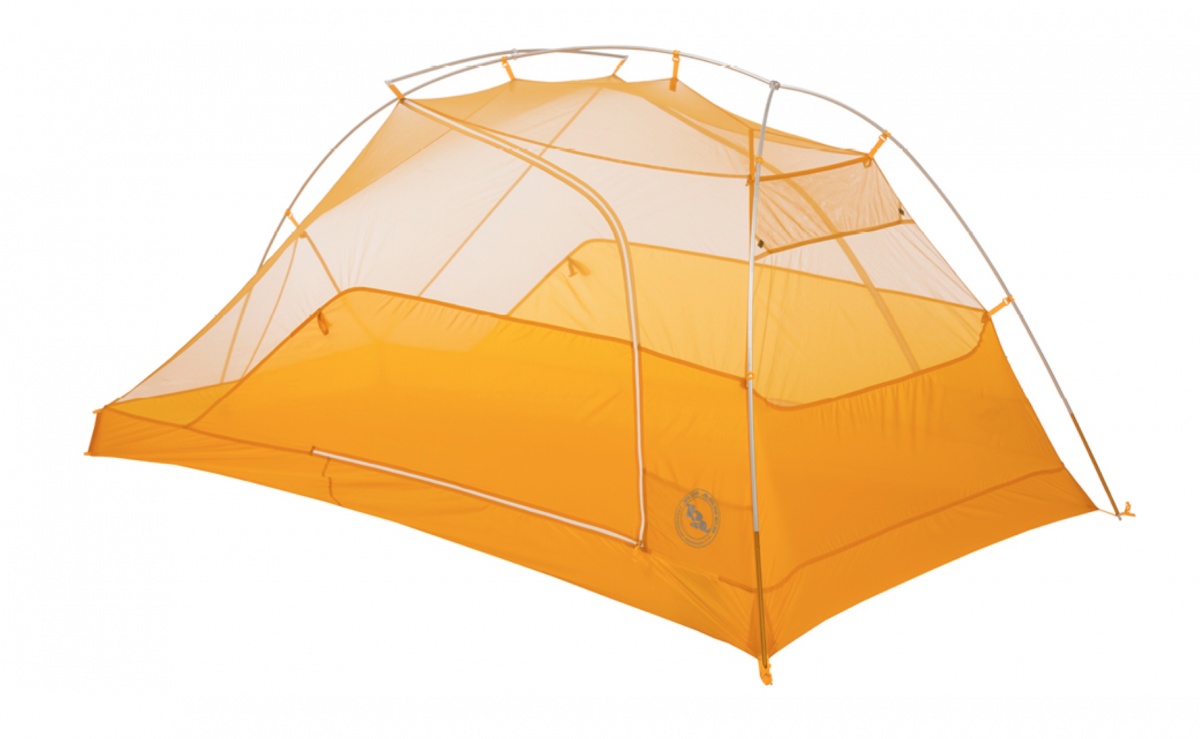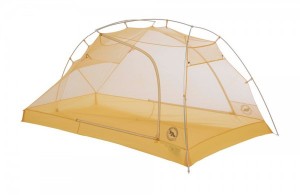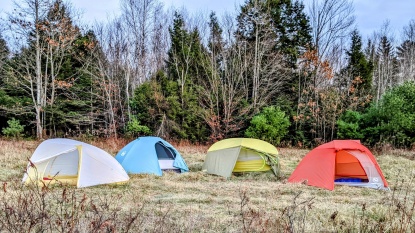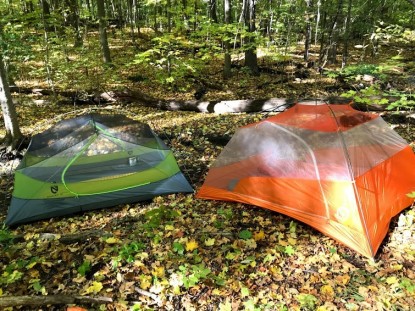Big Agnes updated this tent since our test period. Get the details below.
Sept 2021Big Agnes Tiger Wall UL2 Review
Our Verdict
Our Analysis and Test Results
New Tiger Wall UL2 Solution Dye
Big Agnes redesigned this tent. The latest model is the Tiger Wall UL2 Solution Dye. Compared to traditional methods of dyeing, solution-dyed fabric reduces water and energy consumption during manufacturing, and the resulting product is also more UV resistant and less prone to fading. With this new version, Big Agnes has also included their proprietary TipLok tent buckles for securing the rainfly to the tent's body, and the 6” Dirt Dagger tent stakes are designed to be stronger and lighter. Compare the two models below; the version we tested is shown first, followed by the Solution Dye Tiger Wall on the right.
We've yet to test the new model, so the text below refers only to the previous Tiger Wall UL2. However, we're now linking to the updated Solution Dye model.
Hands-On Review of the Tiger Wall UL2
This tent is light in our packs but still provides the comfort we need after long days of hiking. This tent is not as light or as spacious as some other models in this review, but it does a significantly better job of balancing those competing priorities than other tents. The Tiger Wall sneaks into the top tier of our review, bolstered by its weight and packed size.
Comfort
This model prioritizes lightweight without skimping too much on comfort. The peak height of many UL tents typically rises to a single, small point. In practical terms, this means that only one person can sit up and only directly in the middle of the tent.
The Tiger Wall UL2 is different; the cross pole expands the canopy, which creates an interior with enough space for two people to sit up at the same time — a small but potentially critical feature for long-distance hikers.
We also love the two large side doors, which make it much easier to enter and exit the tent without having to climb over your partner. The high privacy panels are helpful if you find yourself in a crowded campsite on a warmer night when you don't want to put on the fly, and the mesh canopy makes for excellent stargazing.
The vestibules are a little on the small side, but there is still enough room to tuck away a mid-sized pack and hiking boots without having too much exposure to the elements.
Given its size and weight, there are ample storage pockets — one on each side at the head end and another large one on the wall above the sleepers' heads. However, we wish there was a canopy pocket at the very top, either in addition to or in place of the sizeable media pocket.
Ease of Setup
This model offers a traditional setup for a semi-freestanding tent, but also has a couple of trickier-to-navigate features. It has DAC Featherlite poles that provide the primary structure, with a perpendicular cross pole that widens the tent ceiling. It requires two stakes at the foot end to set up fully.
We like Big Agnes' color-coded system, which makes it easy to know which poles connect to which grommets. Attaching the fly can be a little more challenging than we prefer. There are no tension adjusters at the foot (an otherwise typical feature of backpacking tents), which means that you often have to do a little finagling at the head to get it just right. The fly also has two tiny “pockets” for both ends of the cross pole. These pockets are under a lot of tension in use, so the manufacturer used a heavy webbing material to make them, which is tough to manipulate and hard to set up correctly.
The low-profile stakes are lightweight but sturdy. Do note they are gray, so they are easy to lose in the duff. We would recommend taking a minute before your first adventure to tie off a small piece of reflective or brightly colored guyline cord to make them more visible when you are pulling them out of the ground.
Weather Resistance
Weather Resistance is the metric that most concerns us with this tent. During testing, rainwater consistently splashed underneath the fly at the head end of the tent.
Though the ripstop nylon and waterproof coating extend a few inches up the side, this didn't always prove to be enough protection; water would sometimes find its way through the mesh and inside the tent.
We also found that the unique zipper configuration of the doors and fly made for an unusual entry and exit. There are two tent zippers that you have to open in opposite directions, and the fly zip doesn't go up high enough. With clear skies above, this is all just a minor annoyance, but in inclement (or buggy!) conditions, it means that it both takes longer to get in and out of the tent, and water on the fly goes everywhere.
Durability
We were pleasantly surprised by the durability of the Tiger Wall UL2.
Typically, a manufacturer must use a thinner material to get a tent this lightweight, which can compromise durability; however, we didn't experience any failures in craftsmanship. Though we have has similar DAC Featherlite poles crack on us in the field, it is so-far-so-good with the Tiger Wall UL2.
With that in mind, if you are particularly rough on your gear, we think it is well worth investing just a few extra dollars in a piece of Tyvek or contractor tarp to protect the floor on sandy or gravel surfaces.
Weight & Packed Size
This tent is one of the lightest in this review. Though Big Agnes sacrificed a few ounces by including a cross pole for added headroom and slightly heavier material in the privacy panels, it still comes in at a sprightly 2 pounds, 9 ounces.
Measuring in at 5.5" x 18", the Tiger Wall UL2 packs down with the best of them. Split between two people, it offers a super reasonable load for a semi-freestanding shelter.
Value
This is not a budget tent by any means, but there is still great value to be had. For an ultralight tent, it offers considerable comfort for two people. We recommend using a footprint or a (much less expensive) piece of Tyvek Homewrap to protect the floor from wear and tear, but if you treat it nicely, this tent will be a reliable refuge for years of outdoor adventures.
Conclusion
The Tiger Wall UL2 offers one of the best compromises between weight and comfort that we have ever seen in a traditional backpacking tent. It offers large side doors and notably more headroom than its closest competitors. We think that Big Agnes should consider some simple zipper design changes to keep out the rain, but we are delighted to award this tent a Top Pick.
3-Person Version
The 2P does such a nice job of balancing weight and comfort that we wanted to see if the 3P could offer the same. It does, for the most part, but some of the things we love about it become less relevant when it's scaled up to accommodate three people. It does nudge out the length to 88" (from 86"), and the peak height is also a few inches higher at 42". There is plenty of headroom, but the space at shoulder height becomes more of an issue with three people trying to sit up at the same time. The dimensions bear this out: the somewhat generous 52" width of the 2P only increases to 66" (less a standard 20" sleeping pad). It also tapers to 60" at the foot. What this all amounts to is a tent that slides a little too far in the direction of weight savings over comfort.
With that in mind, though, it is still a sub-3-pound tent, which for a semi-freestanding structure is excellent. If you have your crew and minimizing weight is still the top priority, this is a great option. Otherwise, we would opt for a little more space (after all, dividing a tent between three people already reduces the per-person load. On the other hand, if you are extra tall or just like extra space to spread out, this 3P is still lighter than many other 2P models in this review, so it could be worth a look in that instance.
Otherwise, this version is mostly the same as its smaller counterpart: two large D-doors, two side pockets, and a large overhead media pocket, dual vestibules (which, unfortunately, are the same size as the 2P), and same easy-to-pitch, color-coded pole construction.




















